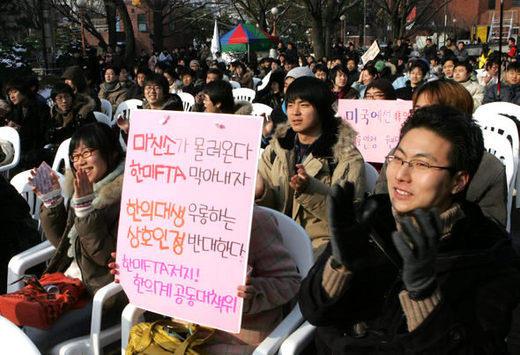 |
|
College students majoring in Oriental medicine, who take part in a rally against the U.S-South Korea FTA.
|
Controversy centered on mutual recognition of health workers
As South Korea and the U.S. are scheduled to hold their sixth round of talks on a proposed free trade agreement (FTA) on January 15, the issue of cross-approving government-licensed professionals is emerging as a sensitive issue. In particular, South Korean doctors practicing Oriental medicine are upset at the prospect of having to compete for jobs with U.S. practitioners, who they say have less training. During the fifth round of talks held early December last year, South Korea and the U.S. agreed to review certain job categories to decide which government-licensed occupations were mutually exchangeable between the two nations. If a government license is accepted in either country, practitioners would fall under the terms of the trade agreement and thus be subject to competition from their counterparts in the other country. South Korean negotiators proposed four previously undiscussed categories - public health, architecture, veterinary medicine, and engineering - to their U.S. counterparts. Among the four job categories, public health is currently at issue. Doctors practicing Oriental medicine are joining in protest against the government’s decision to accept a planned U.S. request to allow for such licenses to be mutually recognized. On January 7, Oriental medicine doctors held a rally in Seoul to protest the decision. Another rally is planned on January 10 in front of government headquarters in Gwacheon.Choi Jeong-kook, a spokesman at the Association of Korea Oriental Medicine, said, "Korean doctors practicing Oriental medicine have the right to take U.S. Medical Licensing Examination, but U.S. acupuncturists have no right to do so," emphasizing the different levels of training received in each country. "Equating two professions that require different levels of education will lead to poor quality in Oriental medicine," said Choi, referring explicitly to the situation in South Korea. South Korean practitioners of Oriental medicine are also concerned that if the proposed South Korea-U.S. free trade deal allows the exchange of Oriental medicine doctors between the two nations, it would spell a similar deal in any free trade talks with China. South Korea has requested that the U.S. mutually recognize some government-issued health licenses, aimed at expanding job opportunities in the U.S. for Korean nurses or doctors. However, pushing this request through is proving a daunting task, as the South Korean government must negotiate with the governments of all 50 U.S. states, as well as related professional organizations. Therefore, experts say, even if South Korea and the U.S. agree to recognize some professionals, it will not be easy to bring the agreement into practice. Related to this, an official at the South Korean delegation, said, "We have agreed that architects should be exchangeable [between the two countries], and are discussing the situation for nurses in free trade talks with the U.S." However, the official said, nothing was confirmed on the matter in past free trade talks with other nations, nor regarding how the issue will be taken up in proposed future talks. Please direct questions or comments to [englishhani@hani.co.kr]





